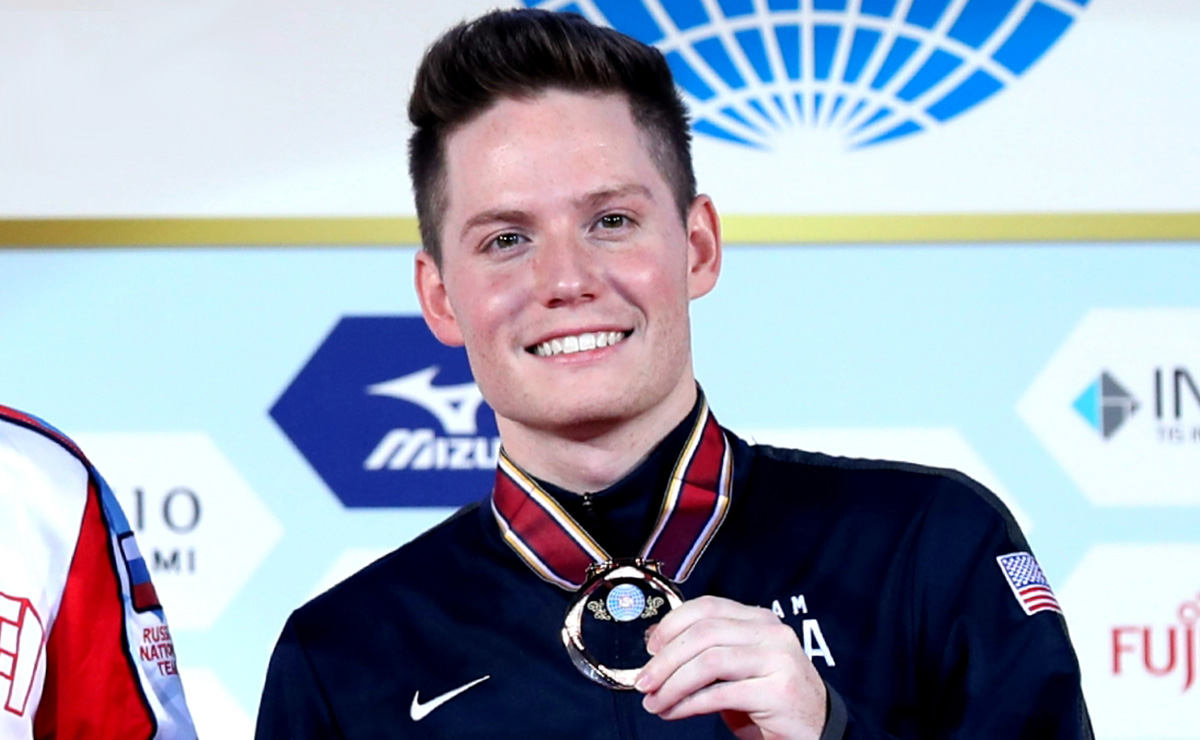
Alex Renkert has taken the 2022 season off to rest his body and weigh his options. After a series of on-and-off-retirements, the reigning The World Games silver medalist in men’s double mini proved he still has what it takes to compete at the highest level last fall, when he advanced to his fourth World Championships individual double mini final at the sport’s marquee event in Baku, Azerbaijan.
Now, at the age of 29 and having spent most of his life in gymnastics, Renkert is contemplating the bigger picture of his evolving, long-term role in the sport. With eight World Championships medals on his athletic resume, he is in a transitional stage where he is eyeing long-term ways to stay involved in the sport while also realizing his influence in the LGBTQ+ community.
“In my early ages, back in elementary school all the way through college, I was always Alex, the gymnast,” said Renkert. “Everyone knew me for that.”
These days, Indianapolis native is finding greater balance, even as his love for the sport keeps him solidly tethered to the community. He currently works as the marketing director for his club, Integrity Athletics, and is serving a second term on USA Gymnastics’ elected Athletes’ Council, where he acts as a conduit between organizational leaders and the athletes they serve, advocating on behalf of gymnasts competing at all levels of the sport. In February, Renkert was named the council’s vice chair.
Although he remains active in gymnastics outside of the competitive arena, he still hasn’t closed the door on his athletic career.
“The competition for me, while it’s gotten more difficult in later years, just gives me that thrill and excitement that you can’t get anywhere else. It always pulls me back in,” Renkert said, admitting that the way he approaches the sport has changed over the years.
“In college, I really started to realize that I didn’t need to go to the gym every single day. I didn’t need to be doing a flip every single day because it’s really, really hard on your body. Of course, I needed to train. I needed to ensure I had the skills necessary to compete safely, but I also needed to find time for myself to build relationships outside of the gym. I needed time to educate myself and prepare myself for a normal, good life. I needed to find that balance.”
The access and insight afforded by more than 10 years as an elite competitor has provided Renkert a potent pathway for success in his role as vice chair of the Athletes’ Council, and he doesn’t see retirement changing that. In fact, it was contemplating stepping away from active competition following The World Games in 2017 that led him to pursue a spot on the council in the first place.
“I wanted to figure out a way to still stay involved in the sport, and I didn’t have a whole lot of knowledge of how the Athletes’ Council was being run in the past. I wanted to ensure there was some kind of change. If I had any voice at all, I wanted to be able to be there for the athletes.”
Five years later, Renkert says the council has much to be proud of and believes changes in leadership at USA Gymnastics have significantly strengthened the body’s reach and impact.
“The restructure from the beginning of my time as an Athletes’ Council member is vastly different,” he said. “There is a voice, and I do feel like I’m being heard now. It’s great being in tune with the leadership.”
Among the notable outcomes achieved through this collaboration, Renkert cites ongoing improvements to the equipment available to athletes at national competitions and the introduction of monthly stipends to support National Team members.
He called the latter “a massive win” for National Team members, adding, “It’s something we never really thought would happen for the non-Olympic disciplines. We dedicate so much time and effort into being athletes and representing the USA. It’s a very expensive sport, so any additional help an athlete can get will keep them going. I think this will be a pivotal change in [gymnasts’] longevity in the sport.”
Renkert made his first Senior National Team in 2010 and has continued to find success at the top levels of the sport, even as a new generation of athletes has swiftly raised the bar.
“Men’s double mini is absolutely chaotic right now,” Renkert admitted. “I’m just so impressed. The difficulty that I’m seeing is beyond my imagination.”
He credits social media with upping the game.
“The guys are really just building off of each other. One guy does this skill. Someone matches it. Someone tries something harder. It is absolute insanity, and I’m impressed probably every single week with the new videos that are coming out.”
That’s high praise from one of the most decorated U.S. trampoline and tumbling athletes of all time. Next month in Birmingham, Ala., the United States’ Ruben Padilla, who is a full two quadrennia younger than Renkert and one of the gymnasts driving up difficulty scores with each Instagram post, will look to match or better his silver-medal performance from The World Games in 2017. The experience, which parallels the Olympics for non-Olympic disciplines, still stands out as one of the most memorable of Renkert’s career.
“Making that team and coming home with a medal – I was just so fulfilled,” Renkert said. “I was the first U.S. male [gymnast] to get a medal at The World Games.”
Renkert struggled to live openly as a member of the LGBTQ+ community during his teenage years but received encouragement and support from athletes he looked up to who were visible members of the community. He wants today’s gymnasts to know they can come to him to talk through whatever challenges they may be facing.
“I didn’t come out until I was 19 years old,” Renkert said. “Obviously, there were many people that knew quietly before that, but I was just really scared all the time about it. Everyone has their own journey. Whether it’s being gay or any other difficulties they’re facing, [it can be] hard to speak openly about them. It’s important for me to be out and proud so that people know they can feel comfort in discussing any kind of matters with me.”
In the T&T world, he has relied on teammates and friends, and hopes others can do the same with him.
“It’s really comforting having people in your corner that share similar experiences,” said Renkert. “There’s so much stress that’s involved with competing both domestically and internationally, and having [others] also LGBTQIA – that we can really lean on each other – has been important in my career.”
Renkert is taking his time to decide whether he will make another run at a World Championships team. In the meantime, he has a wedding to plan. His partner, Blake, proposed last October on the couple’s fifth anniversary.
“It was completely unexpected,” he recalled. “We were walking around the park before we were going to go to our anniversary dinner. He stopped me and got down on one knee [with] a Ring Pop.”
Renkert says the couple skipped dinner and headed straight to the jewelry store instead to pick out rings.
“It was such an awesome experience outside of gymnastics for me because my most-memorable experiences have all been gymnastics-related.”
As Renkert contemplates life beyond competitive gymnastics, he knows he can turn to his fiance, who graduated from law school just last year, for advice and support.
“Blake, for the majority of our relationship, was in law school,” Renkert said. “He recently passed the bar and is a public defender. It’s such an awesome experience to see him go from student to practicing attorney.
“Our worlds are so entirely different because I live in the sports world both for my professional career and my athletic career. He’s an outstanding supporter of me, and it’s great to have a partner like that. It keeps me going.”




